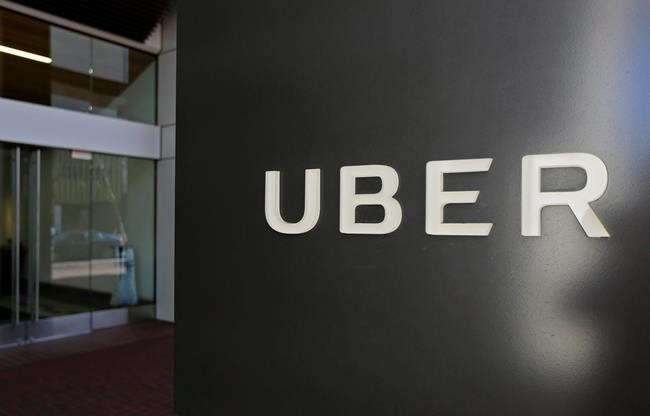
FILE - This Wednesday, March 1, 2017, file photo shows an exterior view of the headquarters of Uber in San Francisco. A top Uber lawyer struggled to explain to a federal judge why the ride-hailing service reached a $7.5 million settlement with a former employee accusing it of stealing its rivals’ trade secrets, even though management considered the allegations to be a bogus attempt to blackmail the company. (AP Photo/Eric Risberg, File)
Republished November 29, 2017 - 4:33 PM
Original Publication Date November 29, 2017 - 3:36 PM
SAN FRANCISCO - A top Uber lawyer struggled to explain to a federal judge why the company reached a $7.5 million settlement with a former employee who accused it of stealing its rivals' trade secrets, even though Uber considered the allegations a bogus attempt at blackmail.
The effort did little to clear up the latest dark cloud hanging over the ride-hailing service. Uber is struggling to defend itself in a high-profile lawsuit alleging that it has been building a fleet of self-driving cars with technology stolen from Waymo, a Google spinoff.
The trial in that case was set to begin next week, but U.S. District Judge William Alsup postponed it until February 5 after learning about a 37-page letter sent to Uber lawyer Angela Padilla by a former Uber security manager and his lawyer. The letter included accusations of intellectual thievery and other shady behaviour that have reshaped the Waymo case.
Although the May 5 letter included allegations that Uber had stolen some of Waymo's trade secrets, Padilla didn't share it with any of the lawyers involved in the case. That has incensed Alsup, who maintains that the letter is a key piece of evidence, even though its allegations remain unproven.
"On the surface, it looked like you covered this up," Alsup scolded Padilla. "For reasons that, to me, are somehow inexplicable."
Padilla testified in a Wednesday court hearing that she sent the letter to the U.S. Justice Department in an attempt to deflate the "extortionist" claims of Richard Jacobs, who was Uber's manager of global intelligence until seven months ago. Jacobs' allegations are now part of a Justice Department investigation into whether Uber has been breaking U.S. laws as it emerged as the world's leading ride-hailing service.
Despite Uber's belief that Jacobs simply was making up a story in an attempt to milk the company, it paid $4.5 million to Jacobs and $3 million to Clayton Halunen, the Minneapolis lawyer who wrote the explosive letter. Jacobs' chunk of the money includes a one-year stint as a Uber consultant that will pay him $1 million through August.
That settlement prompted a Waymo lawyer to ask Padilla: "Does Uber pay money to extortionists?" Padilla responded, "We try not to."
The revelation about the Jacobs settlement probably couldn't come at a worse time for Uber, which has already been trying to clean up the damage done in a corporate culture that fostered rampant sexual harassment , technology used to dupe regulators and a yearlong coverup of a hacking attack that heisted the personal information of 57 million riders and 600,000 drivers.
Uber paid a $100,000 ransom to keep the hacking attack under wraps, a tactic that has irked several U.S. lawmakers and that now threatens to get the company into more legal trouble.
During her testimony, Padilla said Uber reluctantly paid Jacobs and Halunen to avoid distractions, protect the safety of overseas employees and avoid the costs of a lawsuit. The explanation didn't seem to persuade Alsup, who will be presiding over the jury trial.
"People don't pay that kind of money for BS and they certainly don't hire them as consultants," the judge said.
Alsup also lashed out at the $3 million paid to Jacobs' lawyer, Halunen, calling it "unconscionable." Contacted Wednesday, Halunen said he routinely works on a contingency basis that requires him to be paid 40 per cent of the total settlement. "Whether it's $1 or $10 million, I get 40 per cent," Halunen told The Associated Press.
Halunen is likely to be called as a witness in the Waymo trial. Jacobs testified Tuesday that an allegation made in the letter — that Uber tried to steal Waymo's trade secrets — was incorrect.
Jacobs also alleged that Uber that tried to conceal its misconduct by routinely using a messaging service called Wickr that erases conversations shortly after they are sent. Although it denies most of Jacobs' claims, Uber has acknowledged its employees used Wickr for company business. Uber CEO Dara Khosrowshahi disclosed in a Wednesday tweet that he ordered workers to stop using Wickr and other vanishing messages services while on the job in late September, shortly after he replaced company co-founder Travis Kalanick.
"We look forward to our day in court and are as confident in the merits of our case as ever," Uber said in a statement.
But before ending Wednesday's hearing, Alsup warned the company that the task of defending itself against Waymo's allegations is becoming more difficult.
"Poor Uber, I don't feel sorry for you because you brought this on yourself," Alsup said.
News from © The Associated Press, 2017